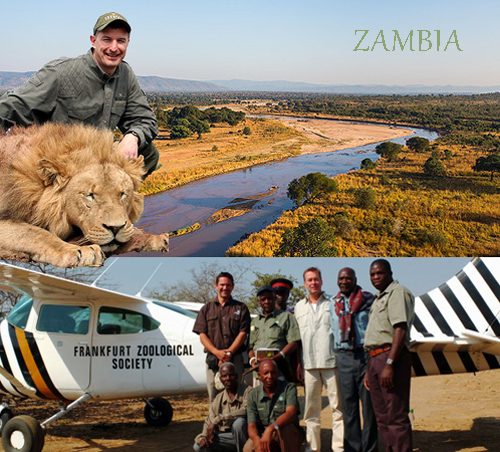 The tug between conservation and hunting has reached a crescendo in Zambia where 30 years of effort by the Frankfurt Zoological Society (FZS) is in jeopardy.
The tug between conservation and hunting has reached a crescendo in Zambia where 30 years of effort by the Frankfurt Zoological Society (FZS) is in jeopardy.
The vast wilderness of eastern Zambia is divided into two great reserves, North & South Luangwa. Like the Serengeti some of the land at the periphery of the these national parks is used for sports hunting.
But unlike the Serengeti Luangwa can well nigh afford hunting. While it contains the richest biomass in Zambia, it’s scant compared to the Serengeti. So as tourism demand increased over the last thirty years Zambian officials correctly reduced leases for hunting.
But in the last 4-5 years tourism has declined continent-wide while there has been a marked increase in demand for sports hunting. So Zambian officials are reversing themselves and allowing more and more hunting.
The most dramatic reversal came in August, 2014.
There was an outcry from the public. This remark taken off the Zambia National Park’s Facebook page is representative:
“Trophy hunting for rich foreigners will not bring tourists to Zambia, it will deter them from coming… I can assure you, I will not visit any country which squanders its wildlife for the pleasure of a few disturbed individuals.”
Immediately the parks authority reversed the reversal, but immediately after that the umbrella state agency above tourism reversed back to the original reversal. The state of confusion has never been resolved.
I see two obvious forces at work here: The first is that sports hunting is on the increase, particularly from Russia and the United States, with very strong increases from a number of South American countries like Argentina. The revenue lost from tourism hurts. From a business point of view, it makes sense to increase capacity in response to increased demand.
But second is probably more significant: the rank confusion reigning between Zambia’s various authorities suggests corruption is rampant. Hunters tend to be quite rich and professional hunting guides are the government pay masters.
Three weeks ago the German embassy hosted a party in Lusaka to celebrate three decades of partnership between FZS and the Zambian government conserving North Luangwa.
A recent elephant survey showed that North Luangwa has the densest elephant population in the country and the most promising black rhino programs.
“I think it is fair to say that 20 years ago no one would have anticipated this development,” the project leader, Ed Sayer, told the guests.
In fairness one of the reasons North Luangwa’s elephant population is the most dense is because there has been so much poaching in the country’s other reserves.
According to Katarzyna Nowak, a South African elephant researcher, Zambia’s Kafue reserve lost almost half its elephant population to poaching since 2004.
North Luangwa is the most remote of Zambia’s reserves. That applies equally to tourists, hunters and poachers. Kafue is much more accessible.
Moreover, hunters themselves are disparaging of Zambia’s reduced game:
“…the quality [of lion and leopard hunting in Zambia] is on the decline due to hunting pressure and one needs a good deal of time to be sure of a good trophy,” writes safariBwana.com which labels itself “The African Hunting Authority.”
Last year neighboring Botswana banned all hunting, and until then it had been a significant hunting destination.
Scraping the old barrel to get the last bit of honey out of it might just crack the barrel.